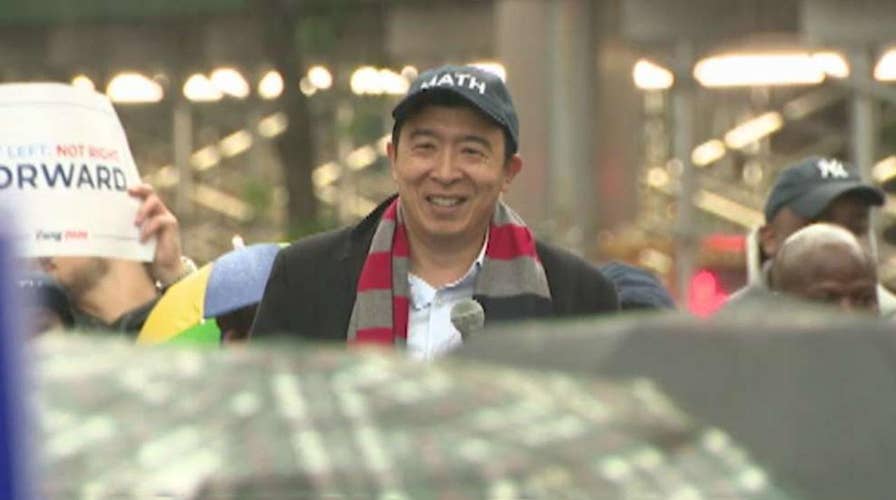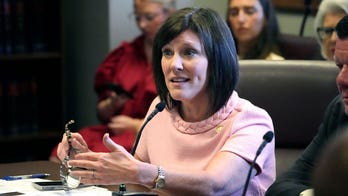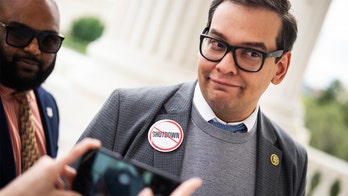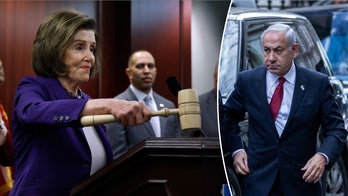Andrew Yang says he's running the nerdiest presidential campaign in history
Entrepreneur turned Democratic presidential candidate is running a numbers-based campaign; Kristin Fisher reports from Des Moines, Iowa.
Democratic presidential candidate Andrew Yang pushed for ranked-choice voting in a tweet on Tuesday, as New York City voters consider a potential change to the city's constitution that would incorporate such ballots into primary and special elections.
Yang, an unorthodox candidate who's portrayed himself as an "Asian man who likes math," has made ranked-choice voting an issue in his candidacy.
New York's system would allow voters to rank their five favorite candidates in order. If no candidate receives a majority of first-choice votes, the last -place candidate would be eliminated and the voters who chose him or her would then have their second-choice votes applied. The process would repeat until one candidate received a majority of votes. Yang's campaign website advocates for a system that allows voters to choose three candidates instead of five, but would essentially function the same way.
"Just voted here in New York - Ranked Choice Voting is on the ballot!" Yang tweeted. "Ranked choice voting would let us express our true preferences and make our politics more dynamic and responsive. We should make it the norm throughout the country."
ANDREW YANG SAYS CLINTON CRITICISM OF GABBARD 'INAPPROPRIATE'
Ranked-choice voting would apply for mayor, public advocate, comptroller, borough president and city council. It would go into effect in 2021 if city voters approve it.
Voters would not be forced to rank every candidate -- they could still choose just one if they want. But Yang and other ranked-choice boosters say the system would free voters to cast ballots for third parties and pick the candidates they truly prefer rather than strategically go for the Republican for Democrat who is the "least bad."
Yang also makes a case that may appeal to Democratic primary voters who believe third-party candidates Jill Stein and Gary Johnson may have cost Hillary Clinton the 2016 presidential election.
Our current system is "vulnerable to a spoiler effect, where a third-party candidate can take just enough votes away from a candidate to cause them to lose, even if that candidate would be preferred to the eventual winner," Yang's campaign website says.
Yang's website also says ranked-choice leads to a 10-point increase in general election voter turnout, helps more moderate candidates win and prevents negative campaigning, lest a candidate alienates voters who support an opponent but still may put them down as a second or third choice.
But others see ranked-choice voting as fraught.
The Heritage Foundation, a conservative think tank, published a report in August that said ranked-choice could obscure voter choices and devalue individuals' votes.
"It also disenfranchises voters, because ballots that do not include the two ultimate finalists are cast aside to manufacture a faux majority for the winner," the report says. "In the end, a voter’s ballot might wind up being cast for the candidate he ranked far below his first choice—a candidate to whom he may have strong political objections and for whom he would not vote in a traditional voting system."
CLICK HERE TO GET THE FOX NEWS APP
The Heritage report also quotes a veto message from former Gov. Jerry Brown, D-Calif., who rejected ranked-choice voting for his state in 2016.
"Ranked-choice voting is overly complicated and confusing,” he said. “I believe it deprives voters of genuinely informed choice.”
Those concerns haven't stopped congressional Democrats from pushing the issue, however. Rep. Jamie Raskin, D.-Md., introduced a bill in September that would require ranked-choice voting to be used in congressional elections. It is co-sponsored by 12 Democrats, including Rep. Seth Moulton, D-Mass., and squad member Rep. Ayanna Pressley, D-Mass.





